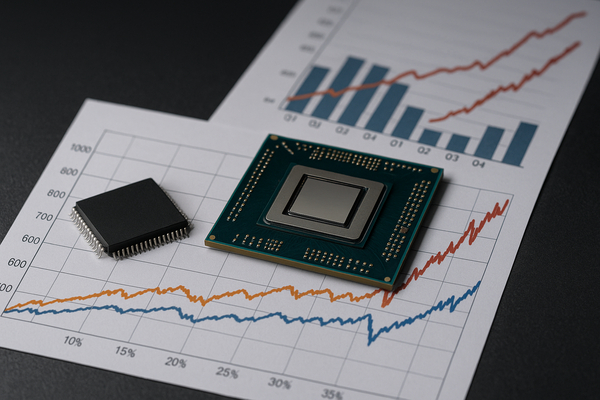
Apple meets China’s commerce minister after a week of earnings and AI headlines that are reshaping investor flows. Apple (NASDAQ:AAPL) faced diplomatic pressure while rolling out product and AI moves — from robotics work to M5 Macs and Vision Pro — that matter today because trade friction and AI demand are colliding. Short term, markets are reacting to TSMC’s (NYSE:TSM) blowout quarter and chip-stock rallies. Long term, hardware spending patterns and supply-chain re-shoring could amplify AI infrastructure demand across the U.S., Europe and Asia. The current mix echoes past trade cycles but with far larger AI-capex stakes.
Market Pulse Check
Investors rotated into semiconductor and cloud infrastructure names after Taiwan Semiconductor Manufacturing’s (NYSE:TSM) unexpectedly strong Q3 profit. Chips led flows. Hyperscaler and data-center suppliers followed. Retail interest concentrated in high-volatility AI plays. Institutional desks favored large-cap infrastructure names where balance sheets support big capex.
Contrast examples show how the session split sentiment. Nvidia (NASDAQ:NVDA) and Micron (NASDAQ:MU) jumped on AI demand signals. Apple (NASDAQ:AAPL) traded with headline risk tied to U.S.-China trade commentary and executive moves, which muted gains in some tech pockets.
Analyst Convictions
Analysts reiterated and upgraded across the roster this week. Salesforce (NYSE:CRM) drew multiple buy reiterations after a bold $60bn FY30 revenue target and Dreamforce optimism. Broadcom (NASDAQ:AVGO) kept support from Bernstein after a major AI-related deal lifted sentiment. Meanwhile, Hewlett Packard Enterprise (NYSE:HPE) saw downgrades and cautious notes after weaker networking guidance, pressuring peers tied to enterprise hardware.
- High conviction: names tied directly to AI infrastructure capacity and memory (e.g., TSM, NVDA, MU).
- Lower conviction: companies with guidance misses or execution risk (e.g., HPE).
Analysts are focusing on valuation gaps. Some stocks show strong fundamentals but compressed multiples; others carry high multiples on near-term demand narratives.
Risk Events vs. Expansion
Trade and regulatory headlines created clear downside risks. China’s Commerce Minister Wang Wentao publicly blamed U.S. restrictive measures after meeting Tim Cook at Apple (NASDAQ:AAPL), underscoring political friction that can disrupt supply chains and sales in a critical market. Separately, China’s stepped-up enforcement around chip imports and Micron’s (NASDAQ:MU) reported exit from supplying servers to Chinese data centers illustrate sovereign-policy risk for suppliers.
On the expansion side, TSMC’s (NYSE:TSM) near-term profit beat and upbeat outlook point to rapid capacity investments for AI chips. That expansion is lifting equipment makers and power-systems suppliers. The result: clear winners in fabs, packaging, and data-center power design; clear losers where exposure to China or guidance misses creates short-term pressure.
Leadership and Fundamentals
Leadership moves and product roadmaps are changing investor lenses. Apple (NASDAQ:AAPL) is reported to be building robots and readying touch-screen Macs, while also losing an AI search exec to Meta (NASDAQ:META). Those shifts highlight two forces: talent migration and a push into new hardware categories.
Microsoft (NASDAQ:MSFT) continues to push AI into core products — Windows 11 AI updates and cloud tie-ups — tightening the link between software leadership and cloud demand. Oracle (NYSE:ORCL) meanwhile spotlighted an aggressive cloud revenue target to 2030, framing infrastructure competition with hyperscalers. Investors are parsing whether fundamentals — revenue mix, margin leverage, capex plans — justify current prices.
Investor Sentiment
Institutional flows show a tilt to large-cap AI infrastructure and memory suppliers. ETF flows into chip and data-center funds rose after TSMC’s results. Retail trading concentrated on headline names and recent outperformers, increasing intraday volatility.
Valuation disconnects matter. Some companies with resilient fundamentals (for example, IBM (NYSE:IBM) and Salesforce (NYSE:CRM)) traded with muted gains, while names tied directly to AI capex saw outsized moves. That divergence reflects both sentiment and differentiated exposure to near-term AI spending.
Investor Signals Ahead
The week’s contrasts — stellar TSMC profits and chip buying versus trade headlines around Apple — are likely to reshuffle leadership across hardware, software and services in the near term. Expect volatility as markets price policy risk in China, AI-capex timing, and execution on product road maps. For now, flows favor companies tied visibly to AI infrastructure; caution persists where trade exposure or weaker guidance creates uncertainty.
Note: coverage here synthesizes recent headlines and earnings signals in the dataset. Some items lacked full detail on flows and exact fund moves; readers should treat those gaps as context for the themes outlined above rather than definitive measurements.












